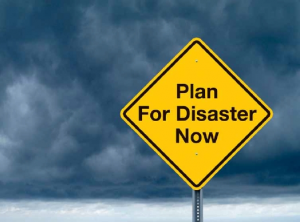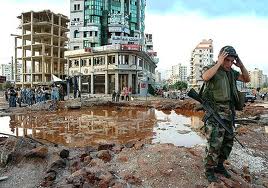QUAERITUR:
I was thinking about a plan for my family for TEOTWAWKI and I immediately thought of how we would find a priest during that time. I wonder if Rome or dioceses have instituted any plans for major disasters. Is this something we should ask our parish priest or diocese and what ideas have you had with how you will attend to the spiritual and sacramental needs of the faithful and knowing how and where to find you?
Good for you for thinking about this. Any responsible parent would form a plan of action and gather what will be necessary for a few scenarios.
Have dioceses implemented plans? I have no idea, but I really doubt it, not as far as sacramental needs are concerned. Not a plan: find a priest. Organizing priests is like organizing those little balls in a prize from the old Cracker Jack boxes. (Some of you will understand that reference.)
My recommendation is to identify a local priest who is amendable to and/or wholly on board with your SHTF Plan. We should all network with people anyway. People are better off working together in a bad situation. Include a priest in those plans. If you are going to go so far as to make a “retreat”, some place to which you can bug out, then you might consider bringing Father, too, or including him in your planning if he is able to get there on his own. This includes bugging in, too, not just bugging out. Some people plan, depending on the situation, to shelter in place. Think of the spiritual advantages. Also, some priests are pretty savvy and even outdoorsy. They can often do more than shrive, though that would be enough to warrant the extra mouth to feed.
How to let people know where I am…. that is another matter entirely.
First, depending on the situation, it might not be a good idea to let people know where you are. I know I sound like Cassandra, but I can envision a time when priests are being hunted, imprisoned and killed. Also, if starving mobs know where you are, you are less safe.
Otherwise, as I mentioned before network with people now and make some plans. Another tool in this scenario could be ham radio equipment and a time/frequency plan for your network. This might sound a little like a novel plot, but broadcasting to your network where Father will be for confession and Mass could address the problem you raise. Also, Father himself could communicate that way to the network you have stitched together. Again, depending on the scenario, you might have security issues to address.
 Don’t wait for dioceses. Make your own plans. Collect your own supplies. That would include having everything you need for Mass.
Don’t wait for dioceses. Make your own plans. Collect your own supplies. That would include having everything you need for Mass.
On a slightly different note, we need to think not only in terms of sacraments, but also sacramental records. This is an issue for dioceses and parish and individuals.
I know that some dioceses have taken good care of their diocesan archives and have encouraged parishes to do the same. My suggestion to parish priests is that they – at the very least – take digital photos of every page of every important sacramental register and then keep that digital record on an encrypted USB drive in the parish’s fireproof safe or offsite.
 Individuals should do the same: at least digitally photograph, if not scan, important documents and keep them on an encrypted flash drive. I recently received from one of you readers an Ironkey, which I am loading up. These hardened drives come in different memory capacities. The large ones are a little spendy, but they have multiple uses.
Individuals should do the same: at least digitally photograph, if not scan, important documents and keep them on an encrypted flash drive. I recently received from one of you readers an Ironkey, which I am loading up. These hardened drives come in different memory capacities. The large ones are a little spendy, but they have multiple uses.
I am sure some of you knowledgeable readers will chime in about how they can be used to help you guard against identity theft and loss of important data. I wouldn’t mind some creative tips. For example, I recently started thinking about how to put a virtual machine on a USB drive.
 Think, for a moment, about a house fire and losing all your precious family photographs. You might start a family project of scanning those photos (a printer/scanner is not expensive (a wireless color printer/scanner comes in well under $100, for example HERE). Scan personal documents, records, all manner of data.
Think, for a moment, about a house fire and losing all your precious family photographs. You might start a family project of scanning those photos (a printer/scanner is not expensive (a wireless color printer/scanner comes in well under $100, for example HERE). Scan personal documents, records, all manner of data.
In any event, think through some scenarios and make plans and implement those plans now. That could make all the difference in a future emergency.
Don’t leave it to other to provide for your material and spiritual security and needs. Plan. Plan. Plan.




































As a seminarian, licensed Ham Radio operator, former computer security researcher, and outdoors enthusiast, this post is Relevant to my Interests®.
For a USB virtual machine, I would recommend something like Fedora’s Live USB. You can install the operating system onto the USB drive, and then book any modern computer into the system, or boot a VM environment into it. You could even include VirtualBox on the USB stick for computers that do not have a way of running VMs easily. It would be easy to add encrypted space on the stick which could be accessed from within the VM.
My only request is that in addition to learning survival skills, people also learn Gregorian Chant and perhaps how to sing polyphony. I would hate to think that our post-apocalyptic bunkers would be without High Masses. [That means adding a thurible and incense to the list.]
Hopefully, the priest would bring the thurible, though of course if he is sneaking from site to site, it would be easier for each place to have one. People could make their own charcoal and incense too, though it would be easier to stockpile it, of course.
On a more serious note, what are the guidelines for old holy oils? I know that in an ideal situation, the oil used should be from the Chrism Mass on the most recent Holy Thursday, but in a post-apocalyptic scenario, it could be several years between when one could get new oil from a bishop. What if the old oil goes rancid? Could it still be used?
I lived near Middletown PA in the Diocese of Harrisburg at the time of the Three Mile Island nuclear meltdown in March 1979.
The Bishop of the Diocese of Harrisburg, Joseph T. Daly, had an announcement broadcast on the local radio stations that he was imparting a General Absolution to all Catholics of the Diocese as a result of the disaster.
That’s the extent of my experience with TEOTWAWKI. God grant it’s the last time too.
We may have no means of communication if someone uses one of those bombs that wipe out all electronics.
I am barely functional in the new electronic media but I wonder: if Big Brother issues/regulates ham licenses, access to frequencies, etc. can he not scramble signals? or otherwise find the operator? I don’t know what I don’t know about all of that but I suppose a savvy operator can cover his tracks on the airwaves.
@bohanlon, The balsam preserves the oil so no worries on that account.
Okay, okay, okay. Here’s my perspective. If SHTF and the rights of the Church are still protected, the priest should be found in church as always. Probably churches will become like hospitals for those in serious need. We may not have time to visit private bunkers and hideaways. Personally, I think that hiding away should be the last resort, when death is more likely the alternative.
If churches start getting taken over, priests will be on the move. Your parish priest may not be the one nearest to you. And the one nearest to you will not necessarily be advertising the fact that he’s a priest. Certain family homes will become the clandestine centers of church activity. Read the biography of the Cure of Ars. When he was a boy, the priest would travel incognito to the home of wealthy Catholic, which also served as a hospital for people in need. Mass at midnight in a tucked away field was the norm.
In either case the life of the Church will continue. Wherever there is the most need for charity and people willing to give it, there you will surely encounter the Lord. That is the plan. Heaven will look out for those who look out for others. If the Church is trampled on, private property and charity will be the good soil for Church activity. Protect the property and nourish the charity! Thank you!
I thought flash drives would be killed by an EMP, and thus only an external hard drive is safe.
It is very important to keep off-site back-ups of any critical records for any organization or business. Consider that any number of disaster may destroy the primary archive. Consider that any number of disasters may destroy both the parish and the diocesan archive in one event. Fireproof safes are well and good, but what about water damage? or the building collapsing and burying the things?
I would, if planning for such things, want a copy of current critical documents in the “cloud”, and probably a USB drive in the “go bag” and likely a hard disk in the bank safe deposit box.
Depending on the nature of records, encryption may actually be a bad idea. Scenarios exist where the records survive but the guy with the encryption key does not. So encrypt what must be safeguarded, but not just everything. You need to plan for your business or organization or church continuing on without YOU, if it should come to that.
Also, it is very important you use survivable file formats. The loss of digital records due to the formatting becoming antiquated is a real issue. Saving everything in more than one format is likely a good idea. If you had a document produced in Word, as an example, it may be wise to save it in the original format, and in PDF, and in one of the open document formats.
Amateur radio equipment with a solar power option is always a good idea. Many HTs have the ability to operate on AAs, and it’s very simple to create a solar battery charger for those rechargable AAs. Takes a couple photovoltaic cells, a little bit of wire, and a diode – only about 5 minutes assembly time.
For longer distance comms, it could be very helpful to know Morse code, as CW transmissions are much simpler than phone emissions over the HF bands, and a CW-only transceiver can be an easy, inexpensive backup.
Pingback: Barcoding Human Embryos - BigPulpit.com
“I thought flash drives would be killed by an EMP, and thus only an external hard drive is safe.”
Build a Faraday cage and put the hard drive in it.
Make two flash drive. Keep one on hand and bury the other.
The Chicken
The real WTSHTF scenario that is more real than most is the EMP attack which will wipe out all electronics. Copying the old fashioned way or keeping the original texts is the only way.
Father, you would be very surprised at the percentage of primary documents dating back before the printing press that survive solely because of priests and parish records. This is not, how shall I put it, an unlikely scenario. Stuff survives because someone at some point in time decided it was not only worth preserving but took the time to keep it safe from all manner of ravages. From Vikings, war, and even protestants.
Part of what I do is digital reconstruction of these records. It’s a fascinating field. Thanks for the shout out Father!
“want a copy of current critical documents in the ‘cloud’, ”
No. A better version of the cloud is private, secure and distributed. Anything that is absolutely crucial, should be stored multiple places in which one single, localized disaster cannot touch. Having it private prevents people form knowing that you have information and what that information contains. This is a very, very, valuable thing. In order for people to confiscate materials, they have to know that they contain valuable things. Having it secure prevents random access through a single point failure.
The cloud is great for things that you want the widest distribution possible and if you want persistence – ie, something to continue being distributed, forever, without further efforts at distribution, that’s the best way to go. Anything else? I wouldn’t bother.
Bosco’s comment made me wonder something: in the case where the Bishop gave general absolution over the radio, did a person actually have to hear him to have the absolution apply, or was his merely doing so enough that that absolution was applied to all in the diocese? I hope all bishops and priests would think to do this in large-scale emergency situations (maybe they do — I think that was the case at the Trade Centers on 9/11). It is a great comfort to me to think that this would be so.
I recently read “A Canticle for Leibowitz” by Walter Miller, a classic sci-fi novel which depicts an order of monks attempting to preserve what’s left of our civilization after it’s wiped out by nuclear war and by a subsequent uprising against scientists and the educated (because they are blamed for having made the catastrophe possible). It was written in 1959 so it depicts the pre-Vatican II Church and liturgy. I found it very moving even though I don’t usually get into sci-fi or post-apocalyptic type fiction — but if you do and haven’t read this book, I highly recommend it.